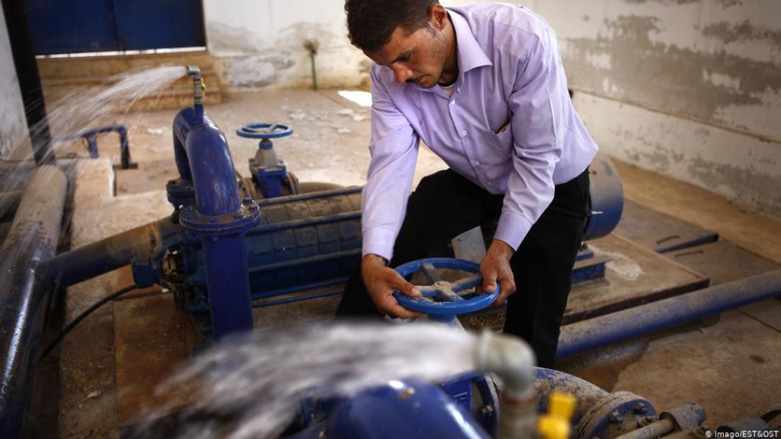ERBIL (Kurdistan 24) – Turkish-backed militia forces on Friday re-pumped a limited amount of water from the Alouk water station to 460,000 civilians in the northeastern Syrian city of Hasakah and its surroundings after having periodically blocked it for months.
Nevertheless, a crucial water crisis continues for residents of the area.
Only a few pumps out of nearly 30 have been re-activated, providing drinking water to Hasakah city and its countryside days after water supply had been cut off, the UK-based Syrian Observatory for Human Rights (SOHR) said on Friday.
On July 5, Turkey cut the water supplies to the Hasakah city and surrounding areas for the seventh time since Turkey and its proxy militias took control of the water station near Ras al-Ain (Serikaniye) in October 2019 during their so-called “Peace Spring Operation.”
This resulted in severe water shortages in the Hasakah province amid both the hot summer weather and the looming threat of possible COVID-19 outbreaks throughout vulnerable populations with severely limited access to healthcare.
“Turkish shelling and subsequent seizure of Alouk water station has resulted in a constant crisis among the civilian population of North and East Syria fed by this key piece of infrastructure, with the flow sometimes cut altogether, and sometimes slowed to a trickle,” Thomas McClure, a Syria-based researcher at the Rojava Information Center, told Kurdistan 24.
“Lately, even when the station is operating, it has only been working 3 of its 24 pumps, meaning hardly any water arrives to at least 700,000 people who rely on water from the station to meet their basic needs.”
As a result, many neighborhoods in Hasaka city are therefore left totally without water even when the station is technically in operation.
“The Kurdish Red Crescent today started an emergency program trucking water to neighborhoods in Heseke receiving no water whatsoever, even though the station has been switched back on,” McClure said.
In addition, co-chair of the energy board of Jazira canton Ahin Swed earlier told Kurdistan 24 that, since mid-March of this year, Turkey has been reducing the supply of water from the Euphrates, negatively affecting power generation from the Tabqa dam.
Dr. Sherwan Berry, co-chair of the Kurdish Red Crescent, confirmed to Kurdistan 24 that Turkey is cutting the water of the Euphrates and the Alouk water station to the northeast, saying, “So this is a war by other means, which also impacts the fight against COVID-19 in northeastern Syria.”
For this reason, the Kurdish Red Crescent and other NGOs are working on alternative water distribution to civilians in Hasakah.
“The main people that are suffering from this problem are the people in Hasakah. So, the NGOs are trying to solve this problem by trucking water,” he said. “So, we try to cover some neighbourhoods, and other organizations such as ACTED, and Solidarités International are trying to cover other neighbourhoods.”
Due to the routine and increasing water and electricity cuts, local civilians have criticized the local authorities in the Hasakah province for the lack of services and bread and private bakeries have hiked up their prices due to inflation of the Syrian pound and general worsening economic conditions in Syria.
“The Self-Administration is required to find solutions and always look for alternatives to serve its people. But we must not overburden its shoulder and ignore the causes of the problems that are hindering the administration,” Aldar Xelil, a senior member of the Democratic Union Party (PYD), said in a Friday statement on social media, in response to the criticism.
He underlined that Turkey is the main responsible actor behind the lack of water and electricity while the local authorities are trying to control the bread prices.
“We must not marginalize our conscience as though the administration has a magic wand for everything.”

